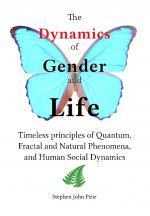[Excerpt Be and Become, © ProCreative, Sydney 2000]
In view of the fact that our very lives are dependent upon definitions and limits, it is to be expected that consideration of the extent of these limits invokes fear within many. Such consideration, in light of our reliance upon modern scientific limited perspectives, strikes at the core of our sense of security and survival.
Nevertheless, it behooves us to reflect deeply upon such matters of limitation and constraint.
We take for granted many aspects of everyday life which are both known and unknowable, such as our intimate experience of the past (known) and the future (Unknowable). And yet there was a time in our history when merely speaking of irrational (“Unknowable”) numbers, for example, was sufficient cause for one’s death. As the late Arthur Koestler wrote in his book The Sleepwalkers: A History of Man’s Changing Vision of the Universe:
It is said that the Pythagoreans kept the discovery of irrational numbers—they called them arrhétos, unspeakable—a secret, and that Hippasos, the disciple who let the scandal leak out, was put to death.1
Koestler cites another source in support of this idea as being Proclos who wrote:
It is told that those who first bought out the irrationals from concealment into the open perished in shipwreck, to a man. For the unutterable and the formless must needs be concealed. And those who uncovered and touched this image of life were instantly destroyed and shall remain forever exposed to the play of the eternal waves.2
These are examples of how people throughout history have feared aspects of our reality which cannot be defined or limited. Aspects of our existence which are open, limitless and without bounds have been known to frighten many people to the degree where they seek to kill those who openly speak of such matters. One example of this penchant for killing those who speak the unspeakable was the execution of the Italian philosopher Giordano Bruno in the year 1600.
Bruno believed that the universe is infinite, that God is the universal world-soul, and that all particular material things are manifestations of the one infinite principle3
Bruno was imprisoned in 1592 on charges of heresy. He faced eight years of questioning, but in refusing to recant his heretical beliefs was burnt alive at the stake in Campo dei Fiori on February 17, 1600.
The persecution of those who speak of ideas concerning the infinite is a recurring theme throughout history, and one that is still evident in the world today. Or put another way, societies generally persecute those who speak the Unspeakable (ideas concerning the Infinite, the Unknowable).
The idea that we have historically deeply feared the infinite (the spiritual) is evident when we observe the history of the introduction and use of “zero” (the equally unknowable and immeasurable conjugate of infinity). India, an Eastern culture orientated towards the spiritual and the void (see next section), embraced the use of zero over 500 years before Western societies.
The Western fear of the infinite and the unknowable is evidenced by the fact that many religious people openly describe themselves as being “God-fearing.” When we correlate God with the infinite (the nameless and the unknowable), we can understand, in certain terms, the origin of such fear. To be “God-fearing” means, in part, to be in fear of that which is infinite, unbounded and unknowable4
For each succeeding generation, there will always be ideas presented by societal “black sheep” who push the envelope in terms of what is possible (Knowable). Those who gently push the envelope in socially acceptable ways (e.g. in sports or business performance) will be showered with accolades and generous financial rewards. But those who do so in substantial ways which unsettle the general populace will receive a commensurate degree of condemnation or persecution. The ideas they present push people outside their personal “comfort zones.” Schopenhauer observed that grand new ideas were generally subjected to a three-step process of ridicule, opposition and eventual acceptance. Generally speaking then, the introduction of bold new ideas which lay well outside the societal comfort zone can be expected to be faced with the following three step process:
- The idea is ignored or ridiculed, and evidence supporting the idea is ignored or denied validity.
- With increasing evidence in support of the idea comes a corresponding increase in the vehemence against the idea: the idea can be violently, sometimes lethally opposed.
- It is accepted as self-evident.
- 1. Arthur Koestler, The Sleepwalkers: A History of man’s changing vision of the Universe, ARKANA Penguin Books, London 1989, p 40.
- 2. Koestler, The Sleepwalkers, p 41.
- 3. Excerpt of text on “Bruno, Giordano,” The Funk & Wagnalls New Encyclopedia (Electronic Edition), Funk & Wagnalls Corporation, 1994.
- 4. Such fear has its origin in ignorance (born of immaturity), as is more fully covered in The Evolution of the Human Psyche.
 "The Dynamics of Gender and Life" ebook is now available at
"The Dynamics of Gender and Life" ebook is now available at